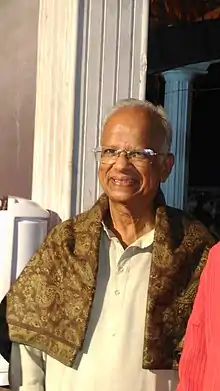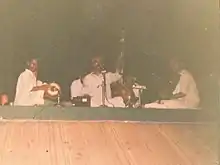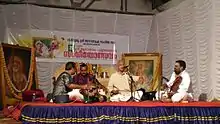Tiruvalangadu Vembu Iyer Sankaranarayanan | |
|---|---|
 | |
| Background information | |
| Also known as | TVS |
| Born | 7 March 1945 Mayiladuthurai, Madras Presidency, British India |
| Origin | India |
| Died | 2 September 2022 (aged 77) Chennai |
| Genres | Indian classical music |
| Occupation(s) | Classical vocalist |
| Years active | 1968–2022 |
T. V. Sankaranarayanan, (7 March 1945 – 2 September 2022) was an Indian Carnatic vocalist (South Indian classical singer), known for his music that stems from the style of his guru and maternal-uncle, Madurai Mani Iyer.[1] TVS was awarded the Madras Music Academy's Sangeetha Kalanidhi in 2003.
Sankaranarayanan was particularly noted for easily reaching the upper notes.
Some of his musical disciples include R. Suryaprakash, his daughter Amruta Sankaranarayanan and his son Mahadevan Sankaranarayanan.
Early life and career


Sankaranarayanan was born in Mayiladuturai of Thanjavur district in the South Indian state of Tamil Nadu. His father, Vembu Iyer, was a disciple of vocalist Madurai Mani Iyer; his mother was Mani Iyer's sister. At age nine, Sankaranarayanan started learning music from his uncle (maamaa). Sankaranarayanan also learned from his father.[2]
He made his debut on the concert platform in 1968 and then gradually established himself as a Carnatic vocalist. He has performed in India and abroad and has several albums. In a profile published in the Financial Express, Subbudu, a music critic, once wrote: "Sankaranarayanan is indeed an asset to the Carnatic music world, where the tribe of good vocalists is dwindling."
Awards and honours
- Gayaka Sikhamani by Bhairavi, USA in 1981
- Swara Laya Ratnakara by Ramakrishnananda Saraswati of Sri Vidyasram, Rishikesh in 1986
- Ganakalaratnam by Dr. Semmangudi Srinivasa Ayyar in 1987
- Nadakanal By Nadakanal, Madras in 1987
- Innisai Perarasu By Bharati Kalamandram, Toronto in 1981
- Sangeetha Ratnakara By Vassar College in 1975
- Swara Yoga Shironmani By Yoga Jivana Satsangha (International)in 1997
- Sangeet Natak Akademi Award in 1990
- Padma Bhushan by the Government of India in 2003[3]
- Sangeetha Kalanidhi by the Madras Music Academy in 2003
- Sangeetha Kalasikhamani by The Indian Fine Arts Society in 2005
- Vidhya Tapasvi by TAPAS Cultural Foundation in 2012
Image Gallery
Stages in concert
References
- ↑ Ramakrishnan, H. (30 December 2021). "T.V. Sankaranarayan: As zestful as always". The Hindu.
- ↑ https://www.rasikas.org/forums/viewtopic.php?t=3957
- ↑ "Padma Awards" (PDF). Ministry of Home Affairs, Government of India. 2015. Retrieved 21 July 2015.
External links
- On a joyous musical journey from The Hindu newspaper
- T. V. Sankaranarayanan discography at Discogs





